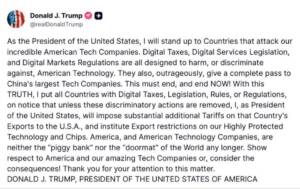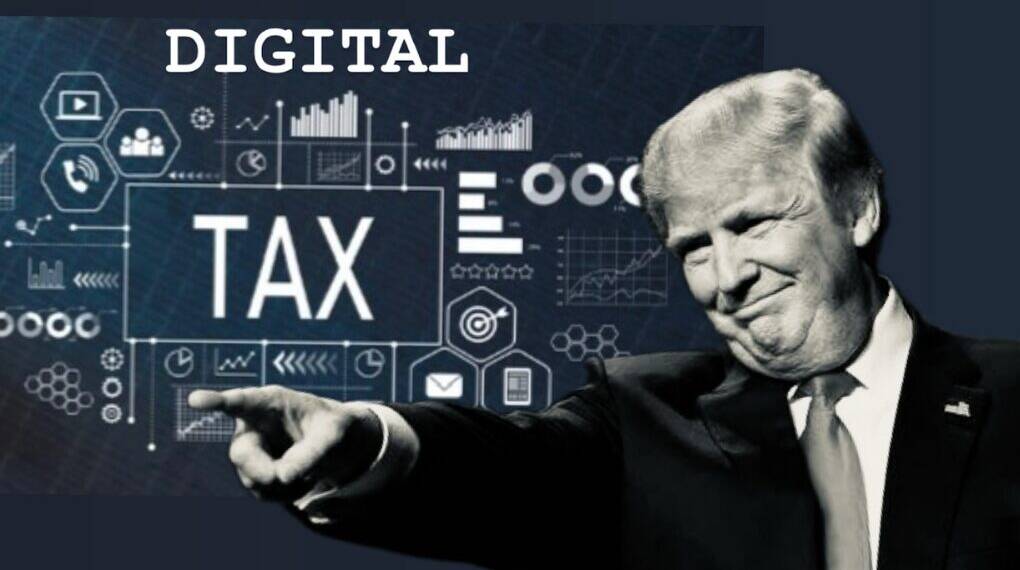U.S. President Donald Trump has escalated pressure on countries that impose digital services taxes (DSTs) on American technology companies. Through a post on his social media platform, Truth Social, Trump warned that if these nations do not revoke such taxes, he would impose “substantial additional tariffs” on their exports to the United States. Additionally, he threatened to restrict exports of sensitive American technology and semiconductor chips to these countries.
According to Trump, these DSTs “discriminate against American Technology” firms like Amazon, Meta, and Alphabet, while allowing Chinese tech companies to avoid similar levies. He declared that the U.S. and its technology firms should no longer be treated as the world’s “piggy bank” or “doormat.”
Understanding Digital Services Taxes and Their Controversy
Digital services taxes are levied on the gross revenues that multinational tech companies generate from digital services consumed within a specific country. Unlike traditional corporate taxes based on profits, DSTs target total revenue streams from activities such as online advertising, digital marketplaces, and datasets.
The DST is intended to address a long-standing challenge in international tax policy—capturing fair taxation from the digital economy, where companies can earn substantial income in jurisdictions without a physical presence. Many countries, including members of the European Union, Canada, India, and Brazil, have adopted or proposed such taxes to ensure their fair share of revenues from tech giants.
However, from the American perspective, these taxes are viewed as discriminatory. Trump and other critics argue that DSTs unfairly single out U.S. technology firms while exempting or overlooking major Chinese companies. This asymmetry, they say, puts American companies at a competitive disadvantage in the global marketplace.
Trump’s Trade Tactic: Tariffs and Export Restrictions
Trump’s threat to impose tariffs is not new. During his previous presidency, he had similarly targeted countries with digital taxes, using tariffs as leverage to push for their removal. His return to power has reignited such tensions.
The latest announcements emphasize two key retaliatory measures:
Substantial tariffs on imports from offending countries: These would raise the cost of goods imported into the U.S., potentially triggering diplomatic tension and economic ripple effects.
Export restrictions on advanced technology and chips: This would limit high-tech exports vital to industries worldwide, increasing pressure on countries relying on American technology while potentially disrupting global supply chains.
By linking tariffs directly to DSTs, Trump is setting a precedent that technological taxation policies could provoke broader trade ramifications, complicating international negotiations over tax reforms in the digital era.
Allies Under Pressure: The Case of Canada and Europe
The pressure campaign has already had tangible impacts. In June 2025, Canada rescinded its DST following strong U.S. opposition, including warnings from Trump during trade talks. This was hailed by the U.S. administration as a diplomatic victory.
Nevertheless, European countries remain less willing to concede. The EU continues to defend digital taxes as sovereign instruments necessary to modernize tax systems and hold multinational corporations accountable. Key EU regulations like the Digital Markets Act (DMA) and Digital Services Act (DSA) govern competition and content moderation in the digital economy, complicating U.S.–EU trade relations.
With the EU viewing DSTs and related regulations as non-negotiable, Trump’s aggressive stance threatens to exacerbate tensions between two crucial trade partners.
Strategic and Economic Implications
Trump’s aggressive rhetoric on digital taxes signals a broader protectionist push to safeguard America’s dominant position in technology. U.S. tech giants represent some of the most valuable companies globally, and their success drives substantial economic growth and innovation.
However, the escalating tariff threats also risk disrupting global trade relations. Countries implementing DSTs argue these taxes are legitimately seeking fair revenue from companies earning significant profits in their markets. Blanket retaliation could provoke retaliatory sanctions, disrupt global supply chains, and reduce cooperation on other critical issues like climate change and security.
Moreover, imposing export restrictions on technology and chips could have profound economic consequences. Advanced semiconductors and technologies are essential inputs for industries worldwide, and limiting their availability could impact everything from consumer electronics to automotive manufacturing.
The Path Forward in Digital Tax Diplomacy
Resolving the DST dispute requires delicate negotiations balancing national tax sovereignty, global trade rules, and fast-evolving technology markets. The OECD-led Base Erosion and Profit Shifting (BEPS) initiative is working to design a global tax framework that addresses DSTs through coordinated reforms rather than unilateral tariffs.
Trump’s tariff threats underscore how volatile this issue remains. They offer leverage but also raise the stakes for diplomatic solutions. For now, the world watches closely as the U.S. signals zero tolerance for what it perceives as unfair digital tax burdens on its flagship technology firms.
Donald Trump’s renewed threat of high tariffs and export restrictions against countries imposing digital services taxes marks a significant escalation in international trade tensions. While aimed at protecting U.S. tech companies from perceived discrimination, the move risks complicating global trade diplomacy and widening economic divisions. The coming months will reveal whether this confrontational approach leads to meaningful policy changes or deepens rifts over how the digital economy should be taxed and regulated globally.








